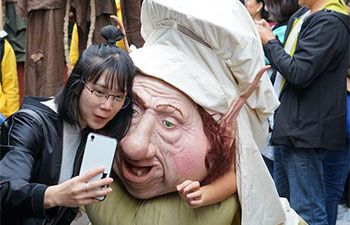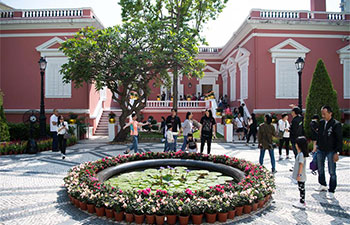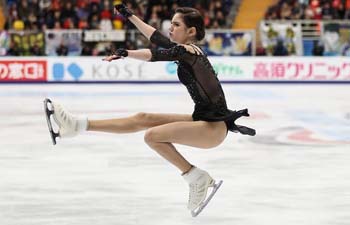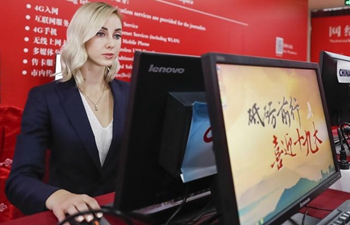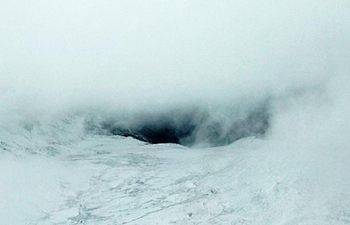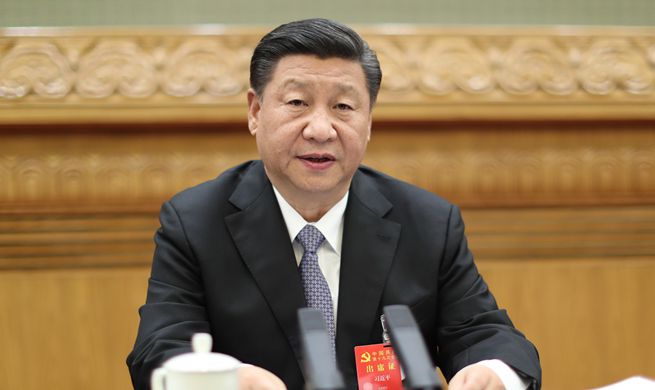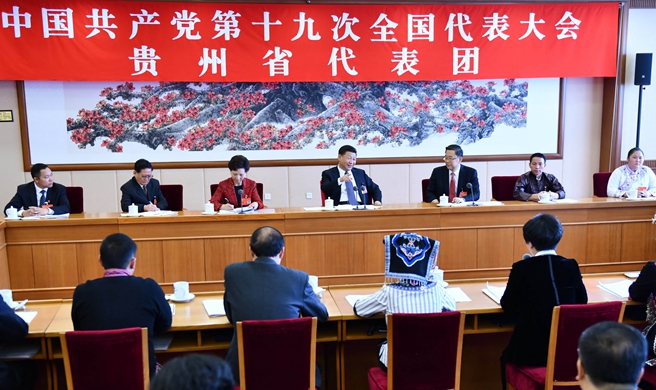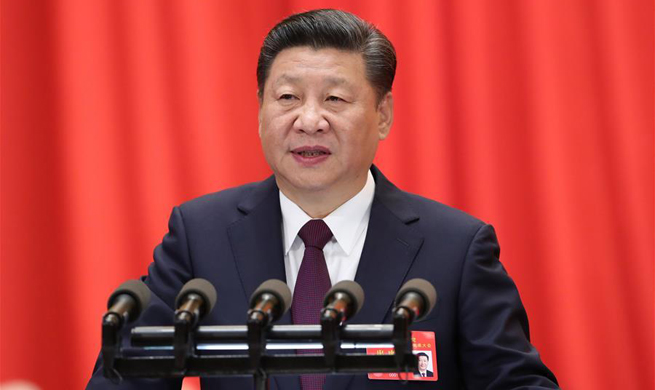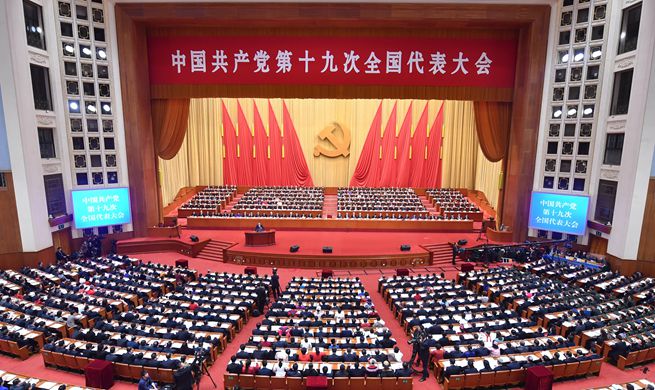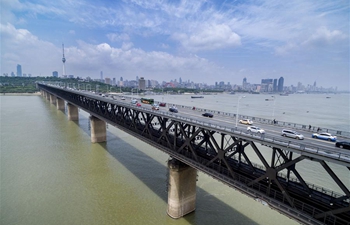by Jon Day
TOKYO, Oct. 22 (Xinhua) -- Voters across Japan cast their ballots on Sunday in Japan's Lower House election, with a mixture of woebegone inevitability about the ruling coalition led by Prime Minister Shinzo Abe securing a comfortable win, coupled with a solid dose of irritation about the torrential downpours, firmly underscoring the national mood.
Abe, who heads the ruling Liberal Democratic Party (LDP) and called a snap election on Sept. 28, is believed to secure a public mandate on the divisive issue of constitutional reform, plans for the allocations of revenue from a tax hike slated for Oct. 2019, and, for issues pertaining to national security.
With mere weeks to cobble together their candidates and election platforms, Abe has all but ensured the two newly-formed opposition parties, The Party of Hope (PoH), led by Tokyo Gov. Yuriko Koike, and the Constitutional Democratic Party of Japan (CDPJ), headed by former Chief Cabinet Secretary Yukio Edano, will be left to battle it out for second place at the polls.
"A lot has been said about Abe deliberately denying the two new parties enough time to put up a decent fight in the election, and while I personally agree that this was Abe's intention, this is what we have come to expect from him and his (LDP) party," Takeshi Shimura, a 49-year-old manager at a well-known construction firm, told Xinhua.
Decked out in a transparent rain jacket and bright yellow Wellington boots and hunched under an oversized umbrella, Shimura said that while politics in Japan is akin to sport in many ways and is always hard fought, there is no referee, per se, and thus hawkish leaders leveraging every advantage they can take has always been par for the course.
"Nothing has changed since Abe retook office in 2012, nothing at all. If anything, things have gotten slightly worse and for this reason I'm not voting for him," said Shimura from outside a polling station at a local school in Nerima Ward, in the suburbs of Tokyo, early on Sunday.
"I respect him as a tactician, just not a politician. He's dodged having to face up to his cronyism scandals and if he wins, will likely extend his term as party head. He's a shrewd politician for sure."
"That said, the CDPJ will be my party of choice," he said, explaining that although it would be awhile until they have enough clout to impact the political scene here, real change does not happen overnight.
He went on to say that his vote is an investment in the future of Japan, even if he doesn't see the benefits directly in his lifetime.
"The party reflects my views most closely and if you don't vote you have no say," he asserted, adding, "this whole business about amending the constitution is nonsense, none of us (Japanese) want that to happen," concluded the construction boss, himself drenched to the bone.
With the typhoon along with a possible sense of apathy and social malaise over the inevitability of the outcome and the political status quo being maintained likely to take its toll on voter turnout numbers, the race for the lower chamber's 465 seats by the 1,180 candidates, could, nevertheless, not be more important for a 39-year-old mother of two, Minami Sasaki, a part time calligraphy teacher from Yokohama.
"I have kids. I'm a mother and it angers me when I hear that people have no intention of voting because it 'won't make any difference.' It's exactly that kind of laziness and ignorance that leads to things never changing," she lamented.
"Yes, there's a typhoon, and yes, the likelihood is that the ruling coalition will win, but if you don't vote then there's no point complaining about the many, many problems we are facing in Japan," said a rain-soaked Sasaki.
"I owe it to my kids to vote and when they're old enough, I'll encourage them to vote too, it's our duty as citizens, I think," she told Xinhua, from a stone's throw away from Hodogaya station in Yokohama.
She also explained that initially she was impressed by Koike's raw gusto and felt that she'd done a reasonably good job as Tokyo governor, but became bemused when she found out about her right leanings and affiliations with right wing groups.
"I found out she was formerly associated with Nippon Kaigi (Japanese nationalist unincorporated association) and the Zaitokukai (ultra-nationalist and far-right political organization) and, for me, this is utterly against my principals. So, by default, I'm backing the CDPJ," she said.
"I think what they stand for is, by-in-large, decent and principled," said the politically savvy mum.
While a fair number of voters told Xinhua on Sunday that they had or would be voting for the ruling coalition, and had some hopes that Abe's promised economic thrust would finally bear fruit while maintained that regarding politics it's "better the devil you know," a young group of voters here begged to differ.
At a study group on Sunday in a trendy cafe near Hon-Atsugi station, eight sophomore students from Tokai University's Isehara campus in Kanagawa Prefecture, were in a heated discussion about the election, prior to hitting the polling station.
The notion of constitutional reform, for these youngsters, was the crux of the debate, with the parties' views on nuclear power also factoring in heavily.
Yuki Nishi, 19, who bears a striking resemblance to the pro baseball player of the same name, argued that nuclear power was indispensable, as Japan has a lack of natural resources and the transition to new energy sources would take time and a great deal of taxpayers' money.
He was quickly reminded, however, by his study mate Luca Tanishiro, of the Fukushima disaster and the nuclear attacks on Hiroshima and Nagasaki that ended World War II and the debate quickly switched back to the constitution.
While two of the eight concluded that Koike was the "best of a bad bunch" and would be good for female empowerment in Japan, a hot topic right now, and two others insisted that the safest bet for security reasons was Abe and that now was not the right time for change, the rest vouched for Edano and his upstart party.
"Changing the constitution is not an option. Most Japanese do not want this to happen and it's our responsibility as the future of this country to ensure our lives are peaceful and our future families and friends inherit a safe country," asserted Shizuka Nakamura, by way of a conclusion, drawing nods of understanding from her peers, if not total agreement.
Most pertinently, perhaps, all eight of them, once they'd finished their lattes, were all heading to their local polling station to vote, excited about being able to vote for the first time since the voting age was lowered last year and evidence, perhaps, that not all youngsters in Japan are indifferent to the politics that will ultimately have a strong bearing on their future.




